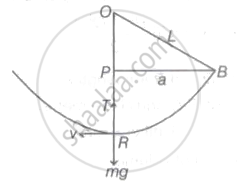Advertisements
Advertisements
Question
A bob of a simple pendulum has mass m and is oscillating with an amplitude a. If the length of the pendulum is L, then the maximum tension in the string is [cos 0° = 1, g = acceleration due to gravity]
Options
mg`[1 + ("a"/"L")^2]`
mg`[1 - ("L"/"a")^2]`
mg`[1 + ("L"/"a")^2]`
mg`[1 - ("a"/"L")^2]`
Solution
mg`[1 + ("a"/"L")^2]`
Explanation:
Consider the figure shown below

The string posses maximum tension when bob Is at the mean position of oscillation i.e., at position R.
From geometry, OP = `sqrt("L"^2 - "a"^2)`
Also, RP = OR - OP = L - `sqrt("L"^2 - "a"^2)`
The whole kinetic energy of bob at position R is converted into its potential energy at position B.
`therefore 1/2 "mv"^2 = "mg" ("L" - sqrt("L"^2 - "a"^2))`
`"v"^2 = "2g" ("L" - sqrt("L"^2 - "a"^2))`
Balancing forces at R,
T - mg = `"mv"^2/l = (2"mg" ("L" - sqrt("L"^2 - "a"^2)))/"L"`
∴ T = mg + 2mg `(1 - sqrt(1 - "a"^2/"L"^2))`
Using approximation, `sqrt(1 - x^2) = 1 - x^2/2`for x << 1, we get
T = mg + 2mg `[1 - (1 - "a"^2/"2L"^2)]`
= mg + mg`("a"/"L")^2`
`= "mg"[1 + ("a"/"L")^2]`
OR
tension in the string is maximum when the bob passes through the mean position.
`T_{max} = mg + (mV^2)/L` .........................(1)
In S.H.M. velocity at the mean position is given by V = aω
For simple pendulum T = `2pi sqrt(L/g)`
∴ `omega = (2pi)/T = sqrt(g/L)`
∴ V = `a sqrt(g/L)` or `V^2 = a^2 g/L`
Putting this value of V2 in Eq. (1) we get
`T_"max" = mg[1 + (a/L)^2]`
